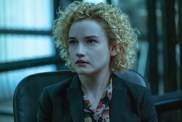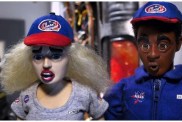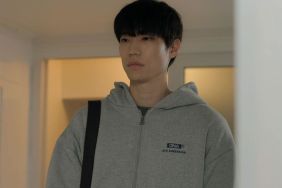Most of us first heard of Len Wiseman with his 2003 directorial debut Underworld and while he’s kept that franchise alive for the past nine years, he’s also been trying to branch into different genres of action with Total Recall being his first full-blown science fiction movie.
He’d been working hard over the past few months to bring his larger scale vision of the future world to life, and he seemed as exhausted as his actors who we would speak with later, but he still gave us twice as much time as he would normally, waving off the unit publicist halfway through the interview when he was trying to cut the interview short.
Q: What drew you to remaking this movie?
Len Wiseman: Really, it was the script. I wasn’t that aware that they were doing “Total Recall,” so the script came to me, just kind of out of the blue, and I read it, and I was really just taken by the direction that the script went to.
Q: In terms of Philip K. Dick, what do you think is the theme of the movie?
Wiseman: There’s a couple of themes going on. One of the overall, just the ideas that I really like, is in the quest to find out who you are, what is actually important ultimately, about that question, and how much of it is a product of your past that makes up who you are or what’s before you in terms of what lies ahead and the actions that you actually are deciding on in the moment? I guess the overall idea of the constant search of who am I and what does that really mean.
Q: Can you talk about the concept of memory being a part of the identity of a person? Is that a big thing in your working on the film?
Wiseman: Oh, for myself? Absolutely, and I would say that there’s more of that in this than in the original. It’s what I was drawn to in the original story, and what I ultimately really liked about the Paul Verhoeven film. Just as I’ve gotten older, and the movies that I myself am attracted to, either scripts I’m attracted to, or just movies in general, if there’s some kind of search of who is this person that we’re watching, whether it’s “The Fugitive” or “Bourne” or “Blade Runner.” When there’s a question of who this guy is, like a mystery, as well as just the question of reality versus fantasy, I’ve always been drawn to. That’s something I really wanted to dive in deeper. I also thought there was more to really see in that side of the character than what we saw in the original in terms of that quest and that search. You consider that you are a good human being, you are a decent human being, but then everything is being given to you as proof that you’re not, what would you ultimately do? Do you just accept that, “Well, I’ve got enough proof here saying that I’m basically a bad guy, but inherently I feel like in my heart I’m good,” then what do you do? So that fascinated me, and I wanted to go into that a little bit more, which I really feel like we have.
Q: The decision not to include the Mars aspect, do you feel that that improved the analogy to put it on earth and separate the classes on two sections of the planet?
Wiseman: I thought the original film does a decent job of that, too. I feel this does ground it a bit more than taking off to a different planet, so I find that a little bit more relatable to me.
Q: Whose idea was it?
Wiseman: It was Kurt Wimmer’s. That was in the original draft as well so by the time that I had read it, there was no Mars. I think when I was just talking to him, that he really wanted to find a different way into it. Obviously, Mars being such a big element to the first one, he decided to go in a different direction.
Q: When did you get Colin Farrell?
Wiseman: Colin was a first choice for me because I was really trying to bring across a tone that the film with Arnold was its own tone and type of film, and I really was not looking to do just a better photographed version or updated visual effects, of whatever the technology is. I wanted to do a different kind of tone. Colin really just I think is a fantastic actor, and he’s just somebody that helps set that tone for me.
Q: What would you consider your vision for your “Total Recall”?
Wiseman: Oh man, I think a balance of serious movie that has a lot of fun. I still want it to be obviously very entertaining and a lot of fun, a great ride, but an intelligent one. Overall, the tone in terms of what kind of movie I’m trying to make is an action thriller. It’s funny, too, because I hadn’t seen it I guess in 20 years since they made it, and I hadn’t really seen it since then, I don’t think, maybe when I was a teenager a couple of times while it was out. I’m sure I saw it a good six, seven times then. I think it was definitely before its time in terms of, I don’t know how many people fully completely understood it at the time because I know I didn’t when I was that age. I enjoyed it, but going back through it, I don’t know, at that age 15, 16, 14, whatever I was, we enjoyed it, but I don’t think we completely understood it. Yeah, I speak for we – me. I didn’t.
Q: This is more of a mystery because he’s trying to find out his identity so how do you balance that with the action? From what I’ve seen there seems like a lot of action but it seems like you still have to play around with what’s real and what’s not real.
Wiseman: Yeah, and actually, when you guys happened to be here, there’s a ton of action, but I absolutely agree with you. Action is completely dead if there’s not the driving emotion or the mystery behind it. It’s a big mystery in this. Honestly, what I love about the project the most is I love a mystery anyways, but when the mystery is about the character himself, I’m always drawn to that. So that’s a really big part of what I think stays alive through this whole thing, that even going through this action, there’s pieces within that action that are puzzle pieces as this guy’s trying to find out the ultimate mystery, which is, who am I? It is definitely something to balance, and I’ve learned. I’ve seen and I’ve learned lessons from either my own stuff or other things, but that’s a big part of it because otherwise it’s a bunch of explosions and really expensive effects.

Q: Are there any nods to the original?
Wiseman: Yeah, there’s more than I thought there would be honestly, because I think there are things that are engrained in me when I was a kid watching it have found themselves in here, just even things that were not necessarily planned.
Q: Nobody says, “Consider this a divorce,” or anything like that?
Wiseman: No, no, they don’t. The one-liners – but you know what? I take that back. In its own form and tone, that’s kind of what goes into it. The one-liners and such are a slightly different tone than this one would be, but they find themselves in there somehow.
Q: What kind of science fiction clichés did you want to avoid in this movie’?
Wiseman: All of them. (laughter) I always try to avoid as many as I possibly can, and some, you just find yourselves in because the nature of a movie, and such. I don’t know, which ones specifically? I couldn’t even tell you, but yeah, it’s constantly the battle to try to stay away from.
Q: You kept all the character names from the original movie like Cohaagen, Hauser, and Quaid. Was there ever any thought to completely going a different direction stemming from the story rather than to do a remake of “Total Recall”?
Wiseman: I mean, I don’t think so. By the time it came to me, it was the script that it was, so I think with the producers that at a point they were thinking so far away from it, but I couldn’t tell you. But, it’s my experience of coming into it, that it was already kinda set in motion.
Q: Patrick told us that the New Britain concept started out as New America. What prompted the change of locale?
Wiseman: A lot of it had to do with that there was kind of a European vibe to what this city is. I also think there’s legal things attached to what we were allowed to call what.
Q: America has a trademark?
Wiseman: I don’t even remember at this point. I just remember having to change a lot of different designs, and legally we can’t do this and legally we can say this, but we can’t say it if you’re using these iconic buildings, but there was definitely a political aspect to it.
Q: Was there ever a push to make this 3D?
Wiseman: Oh yes, yeah, not on my end, but yeah.
Q: How did you resist?
Wiseman: Like this. (Puts up fists.) I’m not against 3D – we’re shooting “Underworld 4” in 3D. It just didn’t work, again with what kind of film I was trying to make. Because it’s already a very fantastic science fiction world, that I want it to be as relatable as possible, even though it was a hundred and some odd years in the future. By putting 3D on top of that, it makes it almost overtly futuristic, if that makes any sense. It makes a world that we don’t recognize even more disconnected. I want it to feel a bit more old school and gritty in its approach and how I filmed it, so that was the reason.
Q: What about the PG-13 rating? This is literally the second movie in a row you’ve done which is based on an R-rated franchise which is made PG-13. The original “Total Recall” almost didn’t get an R because it was so violent, so can you talk about working within the PG-13, and why you think that was the way to go?
Wiseman: One, there is a lot of forces out there beyond myself, and we’re in a different age now where PG-13 also isn’t what PG-13 was, as well. I don’t really feel confined anymore, but I used to be the guy that if it wasn’t a rated R script, don’t send it to me. It’s not going to happen. I don’t know how to shoot a PG-13 movie. But that was also when PG-13 movies to me, they had a different feel to them. I think “Batman” was definitely one that opened up some doors. “Die Hard,” at the end of the day for me, wasn’t that drastically different in terms of how I was shooting, so I really just make the movie I’m going to make, and then if it fits within the rating, that’s great, and it’s just talk about and discuss it after. You’re always having some kind of discussion or battle.
Q: Any chances this could go R or is there no chance?
Wiseman: I doubt it. I think in terms of a movie of this size, it’s just all the forces of what makes up a movie is over $100 and some odd million, it’s very rare that it’s rated R.
Q: Often, when you hear a movie is being remade, it’s met with groans but also a lot more scrutiny. Are you worried of how you’re going to stand apart and more of a critical eye on this movie because it is a remake?
Wiseman: There will be, and it is, and honestly, a lot of those groans, and if you listen, one of them is mine. So, I get it. I’m saying things like, “Well, should they remake that?” Of course, it’s something that comes up as somebody who writes my own projects as well, so it’s a combination of feelings. I really found that the script was so much different, and I really felt like I had just a vision, a take on this that would be so much different. It was a challenge, and okay, here we go. Of course there’s going to be a side that if you’re too different, it’s, “Oh, well, it’s so different, why even do it if it’s going to be that different?” The other group, if it’s too close to it, “Well, they just remade it. There’s nothing new, nothing original. Why do it?” So honestly, it boils down to with all of that out there, I very selfishly make the movie for myself and hopefully everybody else, and a lot of other people will like it. I just go, “What would I like out of a ‘Total Recall’ story?” You just kind of try to put the blinders on to all the remake and what have you.

Q: Something from the original that was very memorable were the creature FX and make-up design so is there still an element of that in your version?
Wiseman: We don’t have creatures because we don’t go to Mars, but that’s one of the reasons why I wanted to build the synthetics, and a lot of the other things, kind of swapping out the creature design for that kind of design with the cars and such. I wanted to make sure that there’s elements in this world that we haven’t seen before, but creature-wise, obviously we’re staying on earth.
Q: How much research have you done to prepare for this memory aspect of the story?
Wiseman: Research? A bit, but I gotta say I’m really just fascinated that Philip K. Dick, in a lot of his stories, they question reality, but they don’t really answer it. I like that, and I like to put the question out there. So, the research I’ve been doing is just my interest and my own mind just ticking away over the years.
Q: Philip K. Dick’s always been kind of a tough sell because you can’t really dumb him down. “Total Recall,” was more of an action movie as was “Minority Report,” but you want to keep the ideas but keep it entertaining and not make it too smart to confuse people. How has that been as far as making this so that it has all the ideas and intelligence of Philip K. Dick without getting to the point where it might lose some of the audience who can’t follow it?
Wiseman: That’s a good question. It’s a very difficult thing to struggle with because my goal really is to make an action movie that’s very fun and very engaging, but like I said, an intelligent one as well, that I do think hopefully we’re moving in a direction where you can have a really good drama with amazing effects as well. The tendency often is to just to dumb it down because it’s a certain arena of movie. Really, the true answer for me is that I want to make sure the movie exists on a couple of different levels. I do think that if there is just a base level that is understood on an emotional level that you know what the character is trying to do in terms of just an emotional relationship or end goal. If you make sure that that one, on a surface level, that most people will grasp, then definitely if you want to dive in there and put your popcorn aside and pay attention that there’s that level that is really woven in as well. I know a lot of people just may blow off one or the other, but I try to have it survive on both of those.
Q: “Inception” was probably the best example of that where it actually worked on those levels.
Wiseman: Yeah, which I personally love. You know, I think a lot of people walk out of movies that are sometimes very complicated and go, “Oh, I loved that movie. It was great.” “What was it about?” “I don’t know.” I probably have seen a few of those myself, but I loved it. If you really want to invest yourself, that there’s something there.
Q: How much did you have to talk to the actors explaining the characters and working out the characters with the actors?
Wiseman: Still doing it, constantly. Everybody, I’ve gotta say, it’s a fantastic cast. It really is. It’s a really great group. Everybody’s fantastic just to work with, but then Colin and I have spent so much time before, during, after, just really going into this guy’s head. Also, it exists on two different levels. This overall concept or problem is that your characters have to play into a false reality, but then for the argument on the plaintiff’s side, which is that this actually is all real, you want to make sure that the performances lay into that as well. So, the constant conversations we have were, “Well, yeah, but then, how committed am I to this, because ultimately I’m lying, right?” I go, “Well, you’re not lying in the reality. That’s actually who you are.” – so, there’s just so much, yeah. Colin’s very detail oriented, which I really like, because obviously as a director, you have to be, so I think he appreciates that I’m obsessively detail oriented and I do with him too. I mean, he’s always kind of checking in on everything and is really, really sharp. He’s super bright.
Q: How’s the multitasking been going between this and “Underworld?”
Wiseman: I’m tired. (laughter)
Q: Why return in that capacity to that franchise?
Wiseman: It’s something I created from scratch. I feel like it’s just a part of me, and so, we talk about remakes, I love that I can be a part of something that has no outside forces of creation other than my own imagination in terms of it being an original project, you know? So, I’m kind of proud of that. It’s become a bit of a family business at this point.
Q: How’s it been directing Kate over and over again?
Wiseman: Yeah, it’s great. In fact, the way it worked into this is just completely bizarre because at the time when I was prepping “Total Recall,” with the date for “Underworld,” there was no chance it was going to happen anyway, so it was like a fun conversation to have, “Hey, about Total Recall?'” but it simply wasn’t going to happen because “Underworld” was going to be overlapping, then way into it, we pushed by enough time, and we kept pushing our start date for “Total Recall” that it opened up. But it means that I’m watching the dailies for “Underworld” and I’m very involved in that as well. It’s not kind of a sideline thing, so I don’t know if I’d do two projects at once again.
Q: Isn’t it crazy how you wait years to get a movie made, and then suddenly you’ve got two huge movies?
Wiseman: Man, tell me about it, yeah. It does really happen like that, that you’re developing a lot. Also, I write a lot, so I had a project that I was prepping that I wrote with Sony, so that’s the movie I think I’m making. You prep everything that’s happening, and then all of a sudden things line up, “Well, this is going to take more time.” All of a sudden, boom, you’re off and going. Yeah, it definitely, definitely happens.
Q: Why did you choose Kate for the wife and Jessica for Melina?
Wiseman: Well, one of the things too that is very different than the original, but in terms of going into kind of your question, too, about really diving into this character who he’s told that he’s one person. They give him a new set of memories and a new set of identity and everything, then they want to make sure that no part of his other life challenges that. So, what made sense to me is that if you’re going to place somebody with a fake wife, I like that they both had kind of a similar coloring, similar vibe, that if he starts to remember things, that it could vaguely in a dream, maybe it’s his life. It seemed a bit odd to me that if you’re going to set up somebody, the big thing that we’d have to make sure is that no surface memory keeps popping up, so I’m going to make sure that I have your fake wife be completely opposite than your wife in reality. That’s even why with this one, I worked with the script and got it to a point where actually just the function of what his job is, he works at a synthetic factory where they build a lot of these synthetic police force, which again, if there’s surface memory about anything having to do with law enforcement or government having to do with that, well, he goes, “Ah, it’s just a fantasy. This is my job. I’m a low-level grease monkey, but that would make sense.” So, that a lot of those tailor into each other, and I wanted a little bit of blurring the lines from his two lives.
Q: Do you know what you want to do next? Maybe that script you were working on before this came up?
Wiseman: I would love to, yeah. Yeah, it’s really hard to get something made out there. I like to create a world. It just costs a certain amount of money, and to do something original at a certain level is really pretty difficult at the moment, so hopefully if things all go well, then I’ve got a few projects that I’ve been working on.









